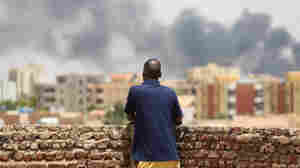Africa
Josephine Dusabimana says she rescued 12 people during the Rwandan genocide. Jacques Nkinzingabo for NPR hide caption
As a brutal genocide raged around her, Josephine smuggled 12 people to safety
Ltesekwa Lekuuk, Paris's half-brother and a fellow moran, heads toward the mountain campsite where Paris had been living until a few weeks ago. Claire Harbage/NPR hide caption
Kenya's Samburu boys share a sacred bond. Why one teen broke with the brotherhood
Isabella Mogeni, 54, from the neighborhood of Mukuru kwa Reuben, looks on as bulldozers destroy homes in the slum area on May 3. Emmanuel Igunza for NPR hide caption
Daniel Ojukwu is an investigative journalist in Nigeria. Foundation for Investigative Journalism hide caption
The scene of a collapsed building in George, South Africa, on Tuesday. AP hide caption
A man swims from a submerged church compound, after the River Tana broke its banks following heavy rains at Mororo, border of Tana River and Garissa counties, northeastern Kenya, April 28. Heavy rains pounding different parts of Kenya have led to dozens of deaths and the displacement of tens of thousands of people, according to the United Nations. Andre Kasuku/AP hide caption
Bodyguards keep close watch as Nelson Mandela celebrates his victory in the South African presidential elections of 1994. As the head of the African National Congress, he helped to build the country's new multiracial government and to establish the free elections in which he won his presidency. David Turnley/Corbis/VCG hide caption
30 years since the end of apartheid, is South Africa still an emblem of democracy?
A photo of Ajmal Khan on his way to Western Europe to find work, taken by a travel companion and sent by Khan to his family in Afghanistan via WhatsApp. The 17-year-old drowned when crossing the Drina River near the city of Bijeljina in Bosnia-Herzegovina — part of a common route for migrants as they head toward wealthier European countries. Courtesy of the family hide caption
People queue to cast their votes In Soweto, South Africa April 27, 1994, in the country's first all-race elections. South Africans celebrate "Freedom Day" every April 27. Denis Farrell/AP hide caption
British Prime Minister Rishi Sunak speaks during a press conference in London on Monday regarding a treaty between Britain and Rwanda to transfer asylum-seekers to the African country. Toby Melville/Pool/AFP via Getty Images hide caption
Although matzo sold in supermarkets is typically square, the round matzo is believed to be the earliest form of this unleavened bread that is eaten during the Passover holiday as a symbol of both suffering and freedom. Ronaldo Schemidt/AFP via Getty Images hide caption
Tunde Onakoya, a Nigerian chess champion and child education advocate, plays a chess game in Times Square, Friday, April 19, 2024, in New York Yuki Iwamura/AP hide caption
This Nigerian chess master aims to raise money by playing the longest continuous game
Surviving children of the Auschwitz concentration camp, one of the camps the Nazis had set up to exterminate Jews and kill millions of others. Research into the appropriate way to "re-feed" those who've experienced starvation was prompted by the deaths of camp survivors after liberation. ullstein bild/Getty Images hide caption
What World War II taught us about how to help starving people today
When the media covers scientific research, not all scientists are equally likely to be mentioned. A new study finds scientists with Asian or African names were 15% less likely to be named in a story. shironosov/Getty Images hide caption
An empty room is pictured in a concrete house in Matam, Senegal. Many families don't have electricity nor the means to own a fan or air conditioning to help quell the intense heat at night, temperatures can stay around 35 degree Celsius throughout the night. John Wessels/AFP via Getty Images hide caption
The grass pea — Lathyrus sativus — is hardy and drought resistant. It tastes like a sugar snap pea, although if that's all you were to eat its natural toxin could make you sick. But breeders might be able to address that issue. Sadasiba Behera/Getty Images hide caption
What are 'orphan crops'? And why is there a new campaign to get them adopted?
Paul Rusesabagina in 2019. Nicolas Maeterlinck/AFP via Getty Images hide caption
The man who inspired 'Hotel Rwanda' is still taking risks for his country
A man looks at the smoke rising next to the Army General Command in Khartoum, Sudan, on April 16, 2023. Faiz Abubakr hide caption
Sudanese refugees who have fled from the war in Sudan get off a truck loaded with families arriving at a transit center for refugees in Renk, South Sudan, on Feb. 13. Luis Tato/AFP via Getty Images hide caption
Paul Rusesabagina in 2019. Nicolas Maeterlinck/AFP via Getty Images hide caption




















